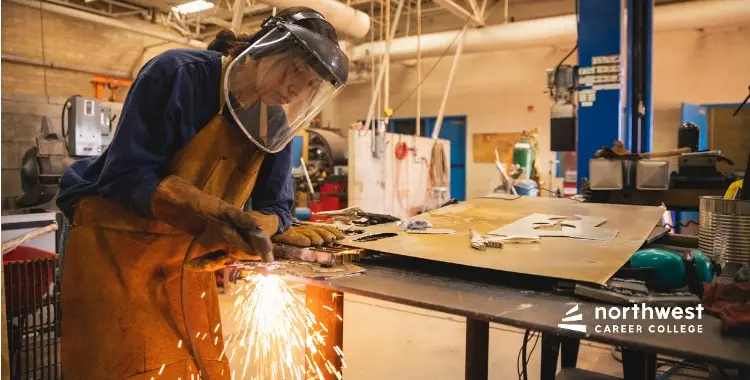Traditional College vs. Trade School – Which One is Right for You?
- Trade School
- March 12, 2024
- 3.2k views
- 5 min read

With the cost of college rising 153% over the past 40 years, significantly outpacing inflation, many people are asking whether a college education is still worth the investment. Other people remain confident they want to pursue a college education but are still intimidated by the cost and ask how to make sure they choose the right higher education pathway for themselves.
While trade schools have existed for decades, they have recently become a much more popular alternative to traditional colleges. You have probably heard someone talk about this distinction on the news or around the dinner table. While they are not right for everyone, trade schools provide a viable alternative to traditional colleges and universities for many students, and in this article, I will outline some of the pros and cons of each.
Table of Contents
Traditional Colleges and Liberal Arts Education
Pros:
- Diverse Learning: Traditional colleges and universities tend to offer a wide variety of potential majors and minors. Further, liberal arts education philosophy tends to focus on incorporating breadth of coursework in addition to depth within a specific field. This can be beneficial for students who are not sure yet what they hope to accomplish by pursuing higher education or want a well-rounded experience.
- Prestige: Graduating from a traditional college or university often provides significant intangible benefits to students. A degree from a prestigious institution can often help you get an interview for a job or provide you with networking opportunities that you would otherwise miss out on.
Cons:
- Expensive: Traditional colleges and universities tend to be very expensive. Tuition typically exceeds available grants and scholarships, often by a large amount. The average cost of attendance for a student living on campus at a public 4-year in-state institution is $26,027 per year or $104,108 over 4 years. Costs are even higher for many private institutions.
- Time-Consuming: Degrees offered by traditional colleges and universities typically require three to four years of full-time attendance to complete. Many students do not have the luxury to wait that long to complete their studies.
- Competitive Admissions: Traditional colleges and universities may have a very competitive admissions process. The most prestigious accept fewer than 10% of applicants, while the average college accepts fewer than 70% of applicants. Most require applicants to submit their application, supplemental materials, and fees nearly a year in advance of starting their program.
Trade School: The Shortcut to Your Career
Pros:
- Quicker Path: Trade schools typically offer a faster pathway to starting your new career. Their programs are usually designed to include only courses that you need for your new profession and nothing extra that might slow down your progress toward graduating.
- Hands-On Learning: Trade schools’ curricula typically focus on hands-on learning. Many students prefer this approach, as it suits their learning style better than traditional lecture-based coursework. Trade school programs are designed so that you can be career-ready when you finish your training and immediately pursue employment in your chosen profession.
- Affordable: Trade schools are typically more affordable than traditional colleges and universities. Because trade schools often have shorter programs and do not have to invest in amenities for students living on campus, they can keep the overall cost of their programs lower.
- Competitive Salaries: Graduates from trade schools can often secure competitive salaries with graduates from traditional colleges and universities. although this is very industry-dependent, it has been observed that the disparity between the value of Education in these two settings has decreased significantly in recent years.
- Job Placement Assistance: Trade schools typically offer more extensive job placement assistance services than traditional colleges and universities. This can help you get out into the workforce as quickly as possible and start earning after you finish school.
Cons:
- Specialized Focus: Trade schools tend to have a very specialized focus in their programs. While many would consider this as a pro, not a con, it’s worth noting that students often do not get extensive exposure to courses outside of their core area of study. This enables students to complete their programs faster and at a lower cost but does sacrifice the breadth of knowledge that students at traditional universities obtained.
- Limited Networking: Students attending traditional colleges and universities consistently interact with students studying different majors and planning to work in different industries. Students at trade schools typically only interact with students in their own program and have fewer opportunities to network with a broader group of individuals.
Conclusion
So, what’s the takeaway here?
Your choice between a trade school and a traditional college or university should align with your goals, interests, and aspirations.
If you’re eager to dive into a specific trade, save money, and start earning sooner, trade school is likely your ideal choice. On the other hand, if you want to explore various subjects and don’t mind the investment, a traditional college degree may be a better fit.
Ultimately, remember that there’s no one-size-fits-all answer. The key is to know yourself, understand your ambitions, and make an informed choice that paves the way for your dreams. The world is full of opportunities waiting for you to seize them!




